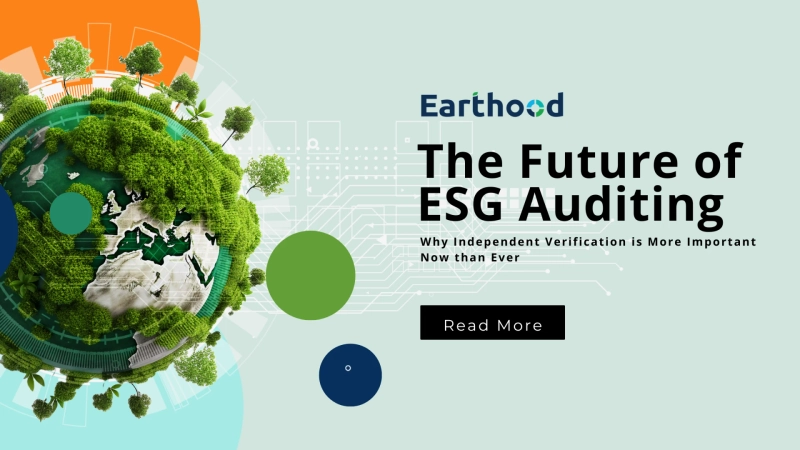Consider purchasing a home without first having it inspected. According to the vendor, everything is flawless no cracks or leaks, and everything functions flawlessly. Would you believe what they say? Obviously not. An impartial inspector would be hired to verify the information. However, this is precisely what has been occurring with businesses and their environmental pledges. They claim to be operating morally upright companies, protecting the environment, and treating employees properly.
The truth is that in 2024, a startling 84% of large corporations stated that climate change posed a significant concern. However, a lot of these same businesses make bold green claims that no one ever checks. They expect us to believe the findings of their own homework grading. That is rapidly changing. New regulations all across the world now mandate that businesses use independent audits to support their claims.
What is an Auditing Firm?
ESG is an abbreviation of Environmental, Social, and Governance. It is the way corporations interact with the planet, the people, and business responsibly. The auditing process of an organization's ESG performance involves auditing the organization's ESG.
Think of this as receiving a health checkup on the sustainability claims of an organization. Would you take the word of a doctor who treated themself? Organizations shouldn't award their own ESG assignment an A+ either. That's the role for external auditors—the reality is vetted, the tall tales are revealed.
Why ESG Verification Matters Now More Than Ever
The universe of ESG reporting is burning. ESG-related investments will hit $35 trillion by 2025, accounting for half of all professionally managed funds. So much money on the table means never before has the urge been so great to inflate or deceive ESG performance.
Greenwashing—the practice of making false or misleading environmental claims—has shifted from the ethical gray to the blocklist. Investors are increasingly doubtful. Regulators are getting stern. Customers are insisting on evidence, not propaganda.
The European Union's Corporate Sustainability Reporting Directive must now be backed by third-party assurance for sustainability statements. That's not advice—that's regulation. Companies need to verify their ESG disclosures as external auditors.
In the USA, in the face of resistance from the politically vocal, the SEC has made disclosure on climate an enforceable rule so that all corporations listed report their carbon footprint. Even though the rule varies from state to state, the direction is obvious: verify or else.
What is Effective Auditing Across ESG?
All audits are not equal. Successful ESG authentication contains some common denominators:
True Independence: There is to be no financial connection between auditors and their tested companies. They are not permitted to be friends, business partners, or receive income from other consulting work for the same client. True independence translates to the courage to bring bad news.
Technical Knowledge: There is specialized expertise required for an ESG audit. The auditors must have expertise in carbon accounting, supply chain review, social impact monitoring, and governance. They need to know what questions to ask, what red flags to identify.
Standard Processes: Good auditing adheres to set processes and procedures. It adopts uniform metrics for comparisons among companies and sectors. Random or inconsistent procedures result in unreliable conclusions.
Broad Coverage: Proper audits are not superficial. They scrutinize source documents, interview personnel, visit plants, and cross-check data authenticity. They uncover whether reported improvements are genuine or accounting tricks.
Transparent Reporting: Audit reports must be understandable to non-experts. They should clearly state what was checked, what was found, and what couldn't be verified. Transparency matters as much as accuracy.
The Tech Revolution In the ESG Audits
Technology is changing the face of auditing by ESG. Software sales for ESG reporting are forecasted to reach over $1 billion by 2024, fueled by new rule requirements for improved tracking and reporting.
Artificial intelligence is able to dig through big data sets to identify contradictions and suspicious behavior. Satellite imagery is able to authenticate claims of deforestation or track pollution by factories in real time. Blockchain makes immutable, unreadable records from data on ESG.
These technologies make auditing quicker, less expensive, and much more complete. They allow auditors to concentrate on subjective judgment decisions while computers perform regular data checking. Nevertheless, computers by themselves are not sufficient—human expertise and ethical judgment are still indispensable.
The Prospective Future for ESG Audits
ESG auditing will grow to be even more significant and sophisticated. There will be intensified regulation, harsher punishment for transgressions, and still more investors seeking tangible ESG data before investing.
The practice itself is booming. There was a sudden demand for ESG experts in 2024 as companies raced to meet new requirements. Companies are hiring experts and educating law teams on how to deal with this intricate environment.
Compliance by business entities with rigorous independent auditing will ensure investor confidence as well as customer confidence. Those found opposing this practice or attempting to compromise will increasingly isolate themselves and pay fines.
Conclusion
The era of blanket ESG pledges without proof is finished. With the environmental and societal concerns expanding, the stakes are getting louder for concrete accountability. The independent validation has shifted from a voluntary credibility booster to a mandatory business necessity for responsible business.
Report cards issued by the companies themselves are no longer taken at heart. Third-party auditors offer the credibility and transparency that business relationships today are so keen on. They safeguard investors from getting cheated, make the companies perform better on the ground level, and make claims around sustainability have their foundation in reality.
Earthood provides full-scope ESG verification services that give your stakeholders confidence in your sustainability path. We don't tick the same old boilerplate boxes we collaborate to build genuine sustainable practices backed by independent, rigorous auditing. Get Earthood partnered with you today and reverse the cost of ESG reporting from compliance drag to competitive advantage. Let's prove your commitment to the planet is no empty promise only proven reality. Get in touch with Earthood today and have a look at what transparency looks like.


